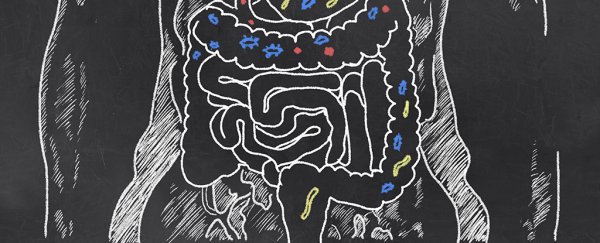We've known for a while now that the relationship between our gut's microbes and the painful condition, irritable bowel syndrome (IBS), actually stretches all the way up into our brains.
New findings now suggest that early childhood trauma could be influencing how the microbes in our gut interact with our brains as we grow, demonstrating a two-way street between the development of our nervous system and the microscopic residents of our digestive system.
Emeran Mayer from the University of California, Los Angeles, has been studying the connection between the gut's microorganisms and our nervous system for years.
"Discovering structural changes in the brain, whether they are primary or secondary to the gastrointestinal symptoms, demonstrates an 'organic' component to IBS and supports the concept of a brain-gut disorder," Mayer explained back in 2010.
Now, Mayer and his team have found that an abundance of specific types of microbes can be associated not just with distinct changes to the brain, but also with experiences of traumatic events early in life.
Irritable Bowel Syndrome is a term given to a collection of symptoms that can include abdominal pain and increased frequency of diarrhoea or constipation.
The condition could affect up to 15 percent of people in the US, most of whom are women under the age of 45.
Until now, most of the research on the relationship between gut microflora and the brain's functioning has been based on mice.
Studies into links between gut microflora and IBS with human subjects have indicated that something is going on, yet the precise nature of the relationship has been hard to pin down.
This latest study combined behavioural evaluations with clinical tests on 29 adults with IBS and 23 healthy adults as controls, to test if people diagnosed with IBS could be split into clear groups based on differences between their gut microbes.
Genetic sequencing of the group's stool samples revealed an interesting split in microbial 'signatures' among those who had been diagnosed with IBS: those with distinct categories of bacteria, referred to as IBS1; and those with bacteria that looked more or less like those of the healthy subjects.
The researchers couldn't see a match between the types of symptoms among those with IBS1 and their microflora signatures, suggesting that this was a new way to classify those with the condition.
Sub-grouping based on the bacteria could help researchers target treatments that are linked to precise groupings of bacteria living in patients' digestive systems, while also explaining why some treatments – such as probiotics or changes in diet – actually make the condition even worse.
Interestingly, the team found subtle but specific differences in brain structure between the sub-groups – areas of the brain associated with pulling together the body's sensory information were slightly bigger in those in the IBS1 category.
On the other hand, the front part of the insular cortex – associated with keeping certain body functions in balance, as well as dealing with emotions and cognitive functions – was slightly smaller in the IBS1 group, as were their ventral prefrontal regions.
It's not clear why these and other neurological differences identified in previous studies exist among people with IBS, though it's possible the different kinds of bacteria in the gut could be producing chemicals that influence the brain's development during childhood.
Based on a psychological evaluation called the Early Traumatic Inventory, the researchers found that those in the IBS1 category reported a significantly higher emotional score than the other two groups.
While further research is needed, there are hints that traumatic experiences early in life could affect the brain, which in turn influences the kinds of microbes that grow in the gut. These in turn could influence the brain's development.
The study itself is just another step in our understanding of how gut bacteria and our brains connect – but the researchers acknowledge the sample size was relatively small, and self-reporting comes with its own problems.
"Self-ratings of bowel habits are known to have a poor correlation with intestinal transit time," the team writes in their report.
While we can speculate, scientists are yet to figure out what's causing these differences in brain structure and gut bacteria.
Any possible feedback loop between the microbes of the gut and the brain is going to be complicated, with conditions such as anxiety, chronic fatigue syndrome, and Parkinson's disease all showing signs of complex interactions with our digestive system's microbiology.
Hopefully, over time we'll discover more about the microscopic citizens that colonise our guts, which we are slowly coming to see as an organ just as important as any other part of our body.
This research was published in Microbiome.
